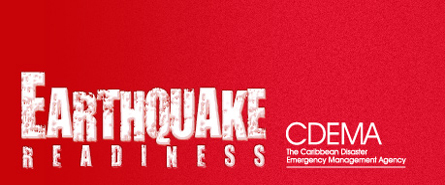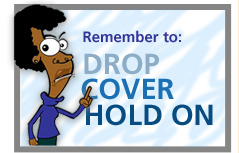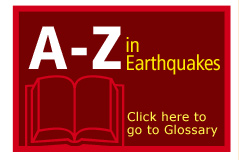|
Every island in the Eastern Caribbean is within 200 kilometres of the largest earthquakes to have occurred in Caribbean history and as such, all have experienced damage during those events. Areas near Trinidad and Martinique experience more earthquakes than other islands of the Eastern Caribbean but no island is entirely safe from earthquakes.
What Caribbean people know about earthquakes can make all the difference in saving lives and reducing disasters. What they don't know can kill them.
There is no season for putting earthquakes in the news other than when they strike. The level of public information and education is relatively high during the annual hurricane season, so the lesson here is that the work to limit damage and casualties (mitigation) from earthquakes is an ongoing story that keeps earthquakes in the public mind.
Caribbean governments and disaster managers face a number of issues in mitigating earthquake damage and casualties. There are questions worth posing to policymakers. SEE MITIGATION OF HAZARDS
Covering the Quake: Tips for Live Reporting
Assuming that they are still in a position to operate, broadcast media houses have a vital role to play in the aftermath of an earthquake, hurricane or other major disaster. Following are some tips for journalists and broadcasters on covering an earthquake:
- Note The Time When The Tremors Occur. It was on the stroke of three where I was, yet a radio station in Barbados was talking about minutes BEFORE three. Check the time, as you reach to make that cell phone call to a loved one. Maybe it's an old hack's reflex. Make it yours. Also try to gauge how long the shaking took place. It will seem like an eternity but it won't be, so if it's still on the wall, the clock will tell you all.
- Send Reporters Out! Too many news outlets think the best place is right at the office in such an environment, just so they can call the authorities - emergency managers, police, hospital, fire etc. GO WHERE THEY ARE. GO WHERE PEOPLE ARE. Talk to the people on the street about their experiences. Or at least go and describe them BEING on the street, scampering out of buildings - and which buildings are still standing. Also, accurate descriptions by reporters on location of the most severe effects are the best antidote to rumour, which will abound after an earthquake strikes. You won't have any traffic problems going into town; journalists, like firemen, are people who run to trouble as people are running from it.
- Make Historical References. A good use of the UWISEISMIC (www.uwiseismic.com) website is noting major events in history, whether they happened in your country or not. UWI scientists note the historical significance of a Caribbean event.
- Explain Events - And Know What You're Talking/Writing About. Whether by dint of your own research (NOT Wikipedia!) or by talking to English-speaking scientists (good luck), explain events and the region's vulnerability. In the aftermath of the November 29, 2007 quake, a leading Barbadian broadcaster, inductee of the Caribbean Broadcasting Hall of Fame said on radio that, as far as he knew, "Barbados is not in the hurric... er... earthquake ... er .. belt." Belt? Really? Explain, for example, why the magnitude of a quake is not an indicator of destructive capacity alone, as if the Saffir-Simpson hurricane scale. Explain the difference between the Richter scale and Magnitude scale. The depth of the quake is a significant issue. How big, yes, but how deep? Don't give the listener a reason to switch off the radio or TV because you fail to keep him informed. Be comprehensive, explain and repeat.
- Radio Is Community. Be The Community. What was the first thing that people did when the earth moved? Ok, the next thing? They turned on the radio. Not the TV, the radio. They want reassurance, information, help, information on whether and which buildings toppled or if anyone else just felt what they did. Be there for them by staying on the air as long as possible, punctuating the news you are gathering with their eyewitness accounts. NOBODY hears that wonderful five-minute report you did 30 minutes to an hour later. It might be as shaky a broadcast as the tremors, but be there and STAY there, calm, reassuring, informative. You don't have to be a 24-hour news channel to do live continuous news but you'll earn the audience's respect and trust that the news networks have.
- If It's A Little Shake Here, It Might Be Apocalypse Somewhere Else. Ok, so you felt something. You can't be the official gauge for either a nation or a region. We are inter-connected, thanks to the Earth's tasty crust. Never mind if your prime ministers aren't speaking to each other, we the people need to be speaking to our fellow Caribbean nations and bringing our colleagues to the audience. A ripple here may be a major event somewhere else. Also make the connection between what people do and disaster. An earthquake is a hazard, an event, not a disaster. A disaster happens when people die or are injured or are displaced by what we do - like build crappy buildings in crappy areas. So make the connection.
- Plan Every Time For Next Time. And there will be a next time. It might be an earthquake. It might a freak storm. It might be a mass casualty event, like a bus or plane crash. When sudden weather or earth movements occur, how prepared are we to go on the air, link up with the community and feed them vital information? There are newsrooms that work only to the next newscast. In any emergency, the deadline is now, not six o'clock.
- Recap. Repeat. Re-tell. Don't get off the air because you've spent an hour and you think that's enough. That's why our listeners switch us off and go watch CNN to learn what's happening in their backyard. RECAP. REPEAT. RE-TELL. Rely especially on the Information for Audiences contained in the Media Toolkit and the UWI Seismic Research Unit (uwiseismic.com). And thanks to such simple, cheap technology, we can record a live interview and turn a clip around in seconds. We can turn around vital live interviews we just did with the emergency chief and the UWI seismic researcher and repeat them, until new information becomes available. Don't assume everyone heard it. We can simply repeat the basic details that will form the basis of our major nightly news programme. In other words, we are writing the story as it happened and telling it and re-telling it. Never assume that your whole audience is listening at the same time.
- How Net-savvy Are You? Really? If you have Internet access, consider assigning a web-savvy reporter to monitor the Web, for solid information, bloggers, message boards, even social networking groups etc. Make sure that the reporter knows where to go for authentic, authoritative information. Don't quote some website in Kansas because it was first on the Google search list. Visit the weready.org website for important information for media and audiences on earthquakes.
- Make Everyone An Expert. Finally, news directors, seniors and juniors should get together to write a rolling news plan, to keep us informed when we need it most. Make sure all reporters, presenters (including talk show hosts), producers and management have expert on hazards and the correct response. The media toolkit includes vital, potentially life-saving information for the audience in the wake of an earthquake. Make sure it is followed and repeated constantly and consistently. This is no time speculate on, debate or invent information. This is the time to be comprehensive and credible, not to be controversial, provocative or popular. The immediate goal is to inform people, report on the impact of the hazard, offer reassurance and be the national centre of calm. To do otherwise, risks the lives of emergency personnel and the general public, too.
LEARN HOW TO KEEP SAFE During an Earthquake
back to top
|













